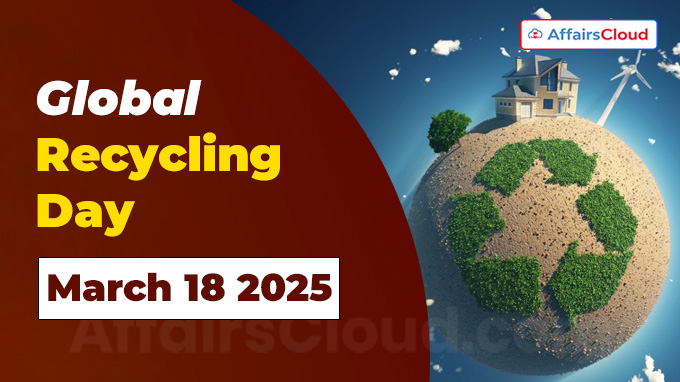 Global Recycling Day is observed annually on 18th March across the globe to highlight the significance of recycling and motivate individuals to take steps in reducing waste and safeguarding the environment.
Global Recycling Day is observed annually on 18th March across the globe to highlight the significance of recycling and motivate individuals to take steps in reducing waste and safeguarding the environment.
- 18th March 2025 marks the observance of the 8th Global Recycling Day.
Background:
i.Global Recycling Day was established by the Bureau of International Recycling (BIR) with the aim of promoting the importance of recycling worldwide. BIR was founded on 18th March 1948.
- Ranjit Baxi, Founder of Global Recycling Foundation introduced the concept of Global Recycling Day during his inaugural speech as President at the BIR’s 2015 Dubai Convention in the United Arab Emirates (UAE).
ii.The 1st ever Global Recycling Day was observed on 18th March 2018, which marked the 70th anniversary of BIR.
iii.The day is supported by Vienna(Austria) based United Nations Industrial Development Organization (UNIDO) and London(the United Kingdom, UK) based Global Recycling Foundation.
What is Recycling?
i.Recycling is the process of collecting and processing materials that would otherwise be discarded as waste and transforming them into new products.
ii.The “3Rs” framework – Refuse or Reduce, Reuse, and Recycle encourages minimizing waste generation, reusing items, and recycling materials to promote sustainability.
iii.Recycling also reduces the need for extracting raw materials such as mining, quarrying, and logging, which are associated with substantial environmental degradation.
iv.Recycling decreases Greenhouse Gas (GHG) emissions, playing a crucial role in combating climate change.
Significance:
i.Recycling plays a vital role in the circular economy by conserving natural resources and reducing Carbondioxide (CO2) emissions.
ii.The “Seventh Resource” (recyclables) currently saves over 700 million tonnes (t) of CO2 annually, with projections reaching 1 billion tonnes by 2030.
iii.In Europe, over 83% of paper and paper packaging is recycled, prolonging the benefits of renewable fibers.
iv.Recycling also minimizes landfill waste and the need for resource extraction, processing, and refining, reducing pollution, energy use, and greenhouse gas emissions, helping combat climate change.
v.According to a study by BIR, recycled materials supply 40% of the world’s raw material needs, highlighting their importance in global manufacturing and resource conservation.
India’s Waste Challenge and Government Initiatives:
i.India currently generates 62 million tonnes of waste annually, including both recyclable and non-recyclable materials, with a steady growth rate of 4% each year, as reported by the Ministry of Environment, Forest and Climate Change (MoEF&CC).
ii.The primary categories of waste in India are solid waste, plastic waste, and electronic waste. India ranks as one of the world’s largest producers of electronic (e)-waste, generating approximately 2 million tonnes annually.
iii.To address the growing waste challenge, the Government of India (GoI) has launched several large-scale initiatives, such as the ‘Swachh Bharat Mission’ (SBM), ‘National Water Mission’ (NWM), and the ‘Waste to Wealth Mission’ (WWM), all aimed at improving waste management and reducing pollution.
Points to Note:
i.In 2019, approximately 22 million tonnes of plastic pollution entered the soil, rivers, and oceans, and plastic leakage is projected to double by 2060.
ii.To combat waste generation, European regulations mandate that European Union (EU) countries reduce total packaging waste per capita by 5% compared to 2018 levels by 2030, 10% by 2035, and 15% by 2040.
iii.According to the World Bank’s (WB) “What a Waste 2.0” report, the world generates 2.01 billion tonnes of solid urban waste annually, with at least 33% of this waste being improperly managed or not treated in the most effective way.
iv.Approximately 9% of the world’s plastic waste has been recycled, with Asia continuing to be one of the largest contributors to global plastic waste.
v.Taiwan boasts one of the world’s most efficient recycling systems, with more than 55% of its waste being recycled.
About Bureau of International Recycling (BIR):
President– Susie Burrage
Headquarters– Brussels, Belgium
Established– 1948




